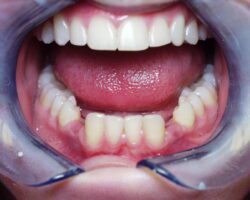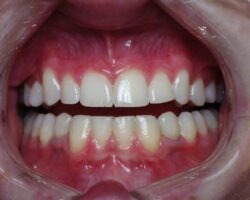Dr. David Weinstock is a talented prosthodontist who restores smiles with all types of dental implants in Bala Cynwyd and Philadelphia, PA. Missing teeth are a common dental problem that many people in our society face. They can be detrimental to one’s quality of life. Replacing missing teeth can prevent a whole range of oral and systemic health concerns.
According to the American Dental Association (ADA), more than 20 million people in the United States are missing all of their natural teeth. And, more than 100 million are missing as many as 11 to 15 teeth.
Teeth implants are the best solution for tooth loss because they support the dental prosthesis better and replace the tooth at the root. They are changing the way dentists replace missing teeth.

What are Dental Implants?
Dental implant-supported prostheses can replace one tooth, many teeth, or even all your teeth. They use three parts that work together to replicate natural teeth.
A dental implant fixture looks like a small screw, and a dentist must surgically place it in the jaw bone. The bone and the implant will fuse to create a strong support base for the replacement teeth. Your dentist will attach an abutment to the implant to join the implant and the dental prosthesis together.
Why Replace Missing Teeth with Dental Implants?
The most common cause of bone loss in the jaw is tooth loss. Teeth and their roots stimulate the jawbone, which is how the bone remains healthy and strong. Even if a single tooth is missing, the bone beneath it will begin to deteriorate, resulting in facial collapse and an aged appearance.
Dental implants are the only option that replaces the missing tooth at its root. Traditional dental bridges and dentures do not do this. Patients with these restorations will slowly suffer from bone loss in the jaw. Using teeth implants will help to avoid bone loss, allowing patients to maintain their natural face shape.
Patients report that dental implants are more comfortable and give them the confidence to eat, speak, laugh, and enjoy life again. They also do not have to worry about their teeth falling out, slurred speech, or eating restrictions.
Getting and securing your new teeth does not require harming surrounding teeth. They will not damage your remaining teeth, nor will they have to support a prosthesis. This will significantly lower your chance of developing gum disease or tooth decay.
Dental implants are also a permanent solution for tooth loss. These titanium posts can last a lifetime if they are cared for properly. You may need a new prosthesis due to wear and tear in the future. However, with proper care, they can last up to 20 years, much longer than any non-implant restoration.
Implant Consultation
If you are missing one or all of your teeth and want to restore your smile’s health, function, and beauty, Dr. Weinstock can help. We will provide an in-depth dental exam and conduct a thorough health history inquiry.
During your consultation visit, Dr. Weinstock will discuss your oral health and cosmetic concerns. Your questions and concerns are essential to us, as we can tailor treatment to them. Our entire team will work with you to help ensure predictable and natural-looking results.
Patient Review
Procedure for Dental Implants
In most cases, placement for dental implants requires two surgical procedures. You will need two surgeries, whether you get one or more implants.
During the first procedure, Dr. Weinstock will place and fuse implants with your jawbone, stopping bone loss and helping secure implants. After this, you will take two to three months to let the implants fully bond with the jawbone and allow the gums to heal.
We are ready to begin the second phase once you have healed from the first procedure. During this phase, Dr. Weinstock attaches abutments to the implants. He uncovers the dental implants by making small incisions in the gums to reach them. You will need a few weeks to heal from this procedure.
During your last visit, your dentist will secure your new tooth or teeth to the abutments. Your custom restoration will fit perfectly in your mouth, and you will leave our office with a new and restored smile!
Dr. Weinstock can attach dental bridges, crowns, or dentures to dental implants. Before beginning any procedures, we will discuss which option is best for your individual needs. Please call our office or schedule a consultation if you have any questions about the process. We are happy to answer any questions you may have.
Single Tooth Implants: Before and After
This patient was missing both canines on the lower jaw. These gaps in their smile affected their smile and confidence. They opted to replace them with dental implant-supported crowns. As you can see, dental implants completely transformed their appearance.


Choosing a Prosthodontist for Dental Implants
Dr. David Weinstock is a talented prosthodontist who restores smiles with dental implants in Bala Cynwyd, PA. He completed the perioprosthesis program at the University of Pennsylvania School of Dental Medicine in Philadelphia and continues to serve as a member of the faculty there.
Prosthodontics is one of the nine dental specialties recognized by the American Dental Association (ADA). A prosthodontist focuses their education on the restoration and replacement of missing teeth. They have training using state-of-the-art methods and procedures for treating many complex dental disorders.
Prosthodontists work with all dental health professionals to solve your dental and oral health concerns. They also provide a high level of care to patients with missing teeth or those with damage to their existing teeth. Dr. Weinstock has completed dental school and three additional years of advanced training and education in an ADA-accredited prosthodontic program.
Dental Implants FAQs
We have answers to some of the most frequently asked questions about dental implants in Philadelphia, PA:
Do dental implants require special care?
While dental implants don’t decay like natural teeth, they still require care to prevent gum disease. With good oral care, tooth implants can last as long as natural teeth. Regular dental visits help us monitor the health of your implants. You should also avoid hard or sticky foods that could damage the implant.
Does plaque build up on implants?
Plaque can build up on dental implants just like on natural teeth. This can lead to gum inflammation and other dental issues. Regular brushing, flossing, and dental exams are essential to keep implants clean and healthy. Maintaining good oral hygiene helps prevent plaque buildup.
Can I get dental implants if I have gum disease?
You need to treat gum disease before getting dental implants. Gum disease can compromise the stability and success of the tooth implant. Once your gums are healthy, your dentist can evaluate your implant suitability. Treating gum disease first ensures a better foundation for the tooth implant and reduces the risk of complications.
Can dental implants damage adjacent teeth?
No, dental implants shouldn’t damage adjacent teeth. They will help preserve the structure and alignment of all remaining teeth. Unlike dental bridges, they provide stable support without relying on nearby teeth, which may require altering adjacent teeth. Proper placement and good oral hygiene ensure implants and surrounding teeth stay healthy.
What is the success rate of dental implants?
The success rate of dental implants is high, typically around 95-98%. Your success will depend on your overall health, oral hygiene, and jawbone quality. Choosing an experienced dentist and following their care instructions will help with the success of the implant. Regular check-ups can help maintain the health and longevity of the implant.
Why do dental implants fail?
Dental implants can fail for a few reasons. One common cause is poor oral hygiene, which can lead to gum disease and infections around the implant. Another reason is if the implant doesn’t properly fuse with the bone.
Smoking, certain health conditions like diabetes, or putting too much pressure on the implant too soon can lead to failure. Keeping your mouth clean and following our dentist’s advice can help prevent implant failure.
Can you get a dental implant while pregnant?
Doctors and dentists usually advise against getting a dental implant while pregnant. The procedure involves surgery, X-rays, and anesthesia. Postpone an implant procedure until after pregnancy. Consult your dentist and OB-GYN to determine the safest timing for your dental care.
How long does it take to get dental implants?
Getting dental implants usually takes several months. First, placing the implant into your jawbone requires time to heal and bond with the bone. This healing process can take about 3 to 6 months.
After the implant fuses with the bone, the dentist will attach a crown or artificial tooth. Overall, from start to finish, the process can take around 4 to 6 months, but it might vary depending on your situation.
Schedule a Consultation for Dental Implants in Philadelphia
Dr. Weinstock treats patients with missing teeth with dental implants in Philadelphia, PA. Schedule an appointment today to learn more about why this treatment option is the best way to replace your teeth.
You can also call (215) 857-8054. If you have questions, please let us know at your next visit. We’re here to help.
Learn more about dental implants on our website:
